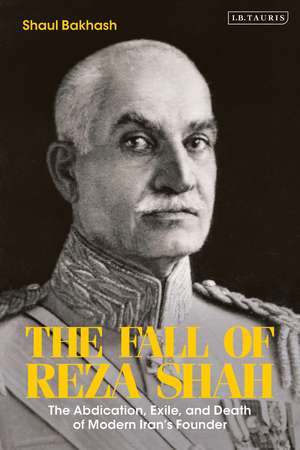The Fall of Reza Shah: The Abdication, Exile, and Death of Modern Iran’s Founder
Autor Shaul Bakhashen Limba Engleză Paperback – 15 iun 2022
| Toate formatele și edițiile | Preț | Express |
|---|---|---|
| Paperback (1) | 145.90 lei 3-5 săpt. | |
| Bloomsbury Publishing – 15 iun 2022 | 145.90 lei 3-5 săpt. | |
| Hardback (1) | 567.75 lei 6-8 săpt. | |
| Bloomsbury Publishing – 27 ian 2021 | 567.75 lei 6-8 săpt. |
Preț: 145.90 lei
Preț vechi: 189.57 lei
-23% Nou
Puncte Express: 219
Preț estimativ în valută:
27.93€ • 30.34$ • 23.47£
27.93€ • 30.34$ • 23.47£
Carte disponibilă
Livrare economică 31 martie-14 aprilie
Preluare comenzi: 021 569.72.76
Specificații
ISBN-13: 9780755638093
ISBN-10: 0755638093
Pagini: 184
Dimensiuni: 156 x 234 x 18 mm
Greutate: 0.3 kg
Editura: Bloomsbury Publishing
Colecția I.B.Tauris
Locul publicării:London, United Kingdom
ISBN-10: 0755638093
Pagini: 184
Dimensiuni: 156 x 234 x 18 mm
Greutate: 0.3 kg
Editura: Bloomsbury Publishing
Colecția I.B.Tauris
Locul publicării:London, United Kingdom
Caracteristici
Includes new evidence that Britain considered replacing the Pahlavi dynasty altogether
Notă biografică
Shaul Bakhash is Clarence J. Robinson Professor of History at George Mason Univeristy, USA. He is the author of Iran: Monarchy, Bureaucracy and Reform Under the Qajars, 1858-1896 (1978); The Politics of Oil and Revolution in Iran (2010); and Reign of the Ayatollahs: Iran and the Islamic Revolution (1990). His articles have appeared in numerous scholarly journals and books, as well as in the New York Review of Books, Foreign Policy, The New Republic, the New York Times, the Washington Post, the Los Angeles Times and other newspapers.
Cuprins
Table of ContentsChapter I: Solder and King, Reformer and AutocratChapter 2: Britain and the Abdication of Reza Shah Chapter 3: 'Dear Anthony', 'Dear Leo': Britain's Quixotic Flirtation with Dynastic ChangeChapter 4: The Journey into ExileChapter 5: Mauritius: 'A Prison'.A Death in Life'Chapter 6: Johannesburg and DeathChapter 7: Wrapping UpChapter 8: Reza Shah's Finances in ExileChapter 9: The Settlement of Reza Shah's EstateChapter 10: A Brief EpilogueNotesBibliography
Recenzii
What is not so well known, and brilliantly described here, is the discussion in London that took place before the installation of Mohammad Reza. ... Bakhash has produced a very personal picture of Reza Shah, gently critical of all hose involved, but understanding of the difficulties and dictates of wartime necessity.
Shaul Bakhash needs to be congratulated for this endeavour which should not be read as a history or hagiography but as a lesson for all Muslim rulers who are pawns in the hands of imperialist powers.
Shaul Bakhash has masterfully uncovered the fascinating saga of Reza Shah's final years--the British decision to force his abdication, their toying with the idea of restoring the Qajars, his exile first in Mauritius and then in Johannesburg, his household difficulties with troublesome children, the problem of being "non-white" in South Africa, and finally the tax disputes over his estate. The book is meticulously well researched in addition to being lively, succinct, and a good read.
Shaul Bakhash's study is an objective, masterful and beautifully written account of the last years life of one of the architects of modernisation in the Middle East. Meanwhile, with great skill Bakhash depicts the practice of great powers in the realm of the international relations, assaulting the sovereignty of small nations when their own interests come first. A timely look at the world today coming out of the Cold War.
Shaul Bakhash needs to be congratulated for this endeavour which should not be read as a history or hagiography but as a lesson for all Muslim rulers who are pawns in the hands of imperialist powers.
Shaul Bakhash has masterfully uncovered the fascinating saga of Reza Shah's final years--the British decision to force his abdication, their toying with the idea of restoring the Qajars, his exile first in Mauritius and then in Johannesburg, his household difficulties with troublesome children, the problem of being "non-white" in South Africa, and finally the tax disputes over his estate. The book is meticulously well researched in addition to being lively, succinct, and a good read.
Shaul Bakhash's study is an objective, masterful and beautifully written account of the last years life of one of the architects of modernisation in the Middle East. Meanwhile, with great skill Bakhash depicts the practice of great powers in the realm of the international relations, assaulting the sovereignty of small nations when their own interests come first. A timely look at the world today coming out of the Cold War.
